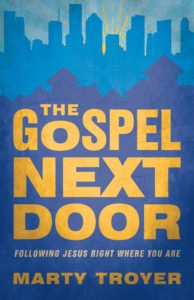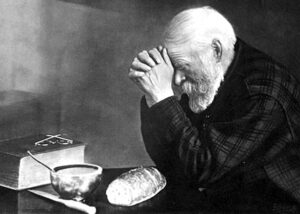God is at work and the gospel is alive in our cities, towns and communities. This is the message Marty Troyer wants to share in his new book, The Gospel Next Door, released by Herald Press.
As a pastor in Houston, Tex., Troyer has found the gospel to be thriving in the city. “People are sharing Jesus, pursuing shalom in the city,” he says, adding that the old division of evangelism and social justice breaks down as Christians combine these in life-giving ways.
In addition to pastoring Houston Mennonite Church, Troyer writes a blog hosted by the Houston Chronicle. Entitled “The peace pastor,” it emphasizes a gospel-centred Jesus ethic.
In The Gospel Next Door, Troyer writes about the gospel message through the lenses of following Jesus, making peace and overcoming injustice. “Jesus is the centre, and it ripples out from there,” he says.
Finding God’s work in the world starts with spiritual tools, according to Troyer. It is rooted in Scripture and good worship. “A good hymn book is one of the greatest tools for justice we have,” he says.
As a church reaches out in its community, it finds others working for God’s kingdom. “This is a mosaic of stories,” Troyer says. “We Mennonites don’t have a corner on the God of peace. So many people share those values and that passion.”
In his new book, Troyer recounts stories of Houstonians whose faith in Jesus drives their work: against violence in their neighbourhoods, for Habitat for Humanity and against human trafficking. “The church is the one staring into the darkness and working for change,” he says.
“My pen pal Terrence went into prison at age 12 and is now 38 and still behind bars,” says Troyer. “In Houston prison ministries and restorative justice, the church is leading the way.” Christian ministries are addressing overcrowded prisons, mass incarceration and racism.
Partnering and praying with different denominations clarifies Christian language about the gospel, Troyer believes. “Personal faith has come alive as we opened our doors and eyes to the rest of the church,” he says.
Troyer hopes readers will discover broader church partnership. “The world is hungry for God,” he says. “They don’t see it in the church regularly, so they are excited about it.” He believes churches need to stop working alone and engage publicly, talking with and listening to more people.
Troyer makes the point that The Gospel Next Door is not about one pastor and one church. “We are one piece of the mosaic,” he says. His book starts to put together the mosaic of the gospel happening in Houston—one example of God’s kingdom in action.
An interview with Marty Troyer
Ardell Stauffer, a freelance writer and editor, interviewed author Marty Troyer for MennoMedia.
AS: Tell me about your title: The Gospel Next Door. What’s different about the “gospel next door” from the gospel anywhere?
MT: That idea is really central to the book. We’re not taking something where it isn’t. The gospel is already alive next door. There are people in our cities living for the gospel whom we’re not aware of. We’re not alone. Maybe particularly as Mennonites, we don’t have a corner on the God of peace—so many people share those values and that passion. This means something is already happening that I’m invited to.
AS: Are you addressing the church in the city primarily?
MT: Yes and no. I focus on one city. I hope people will see this in their own context. My examples are widely applicable in other places. I’m really passionate about being local—not just for an urban audience, but out of an urban context. I’m telling stories about a particular place as illustration.
AS: Your book sections talk about the gifts of Jesus, peace and restoring justice. What is significant about those gifts in a community?
MT: The gospel helps us to see more clearly. I’m fleshing that out in those three directions. The book is centrally about Jesus. To understand Jesus, we have to understand shalom and justice. I love Paul’s language: “that God is able to accomplish abundantly far more than all we can ask or imagine” (Ephesians 3:20). Jesus is the centre and it ripples out from there.
In Houston, I see the church at work, stories of people sharing Jesus, pursuing shalom in the city. That’s one of the real stories in the missional movement, that ministry is kingdom work and for the common good, rather than the old dichotomy of evangelism or social justice. Here people are combining those in a really life-giving way.
AS: How do you see that happening in Houston?
MT: I tell a mosaic of stories, about groups, individuals, and families who are not part of my church—people who, because of faith in Jesus, have come to a stand of nonviolence; who are training high school youth to have different options from the military; who live in dangerous or impoverished neighbourhoods; who, because of faith, are working against violence. These are not just fantastic stories, they are game changers for the church.
When you see this mosaic together, you see there is a church in Houston, and it’s the whole “Big C” church.
AS: What are ways for churches to connect into the larger church?
MT: There is so much happening. There are few ministries that need to be created by churches or small groups. Almost always there’s another organization to partner with or to join. Instead of saying, “Here’s a problem, we need to create a ministry,” say, “Here’s a problem; maybe the gospel helps us to see it. Check it out, people have built something already to address this.” We need to help energize what’s already happening.
We then can respond differently, not with guilt or burnout. When you are able to say that the gospel is already working, people come alive and can do more by referring them to the ministry that is already there.
AS: What tools can we use to find the work of God happening in our communities?
MT: My chapters in the book help provide those tools. Some are spiritual tools—not just trying to Google things on the computer. To see what God is doing in our context, we must be rooted in Scripture and worship. A good hymn book is one of the greatest tools for justice we have. Then we let that ripple out into our communities. How is God the God of Exodus and of Revelation today?
We Mennonites don’t have to recreate the wheel; we can go back to those things that were brilliant. For example, Mennonite Central Committee, which was built on deep relationships; Mennonite Disaster Service; Ten Thousand Villages; and Christian Peacemaker Teams. These are effective communal organizations, not just birthed by one person; they are deeply communal things.
AS: You have a blog, “The peace pastor,” hosted by the Houston Chronicle. How has that been part of your church’s outreach?
MT: I’m a public theologian. A key reason for the book is not just my work but my congregation. We are putting ourselves out there in a public way. This reaching out has formed the book, how we discovered partnership and the people we are connected to now. Through the blog, I became aware that there’s a deep hunger in the world for the Anabaptist Christian way of being. The world is hungry for God. They don’t see it in the church on a regular basis, so they are excited about it. There are lots of Anabaptist-minded people. It opens doors to relationship.
My goal is really to showcase the best in this community. What’s really central is that grace is the hinge between the inner life of faith and the outer life of love. It is a personal grace-filled relationship, but also outward.









Leave a Reply
You must be logged in to post a comment.